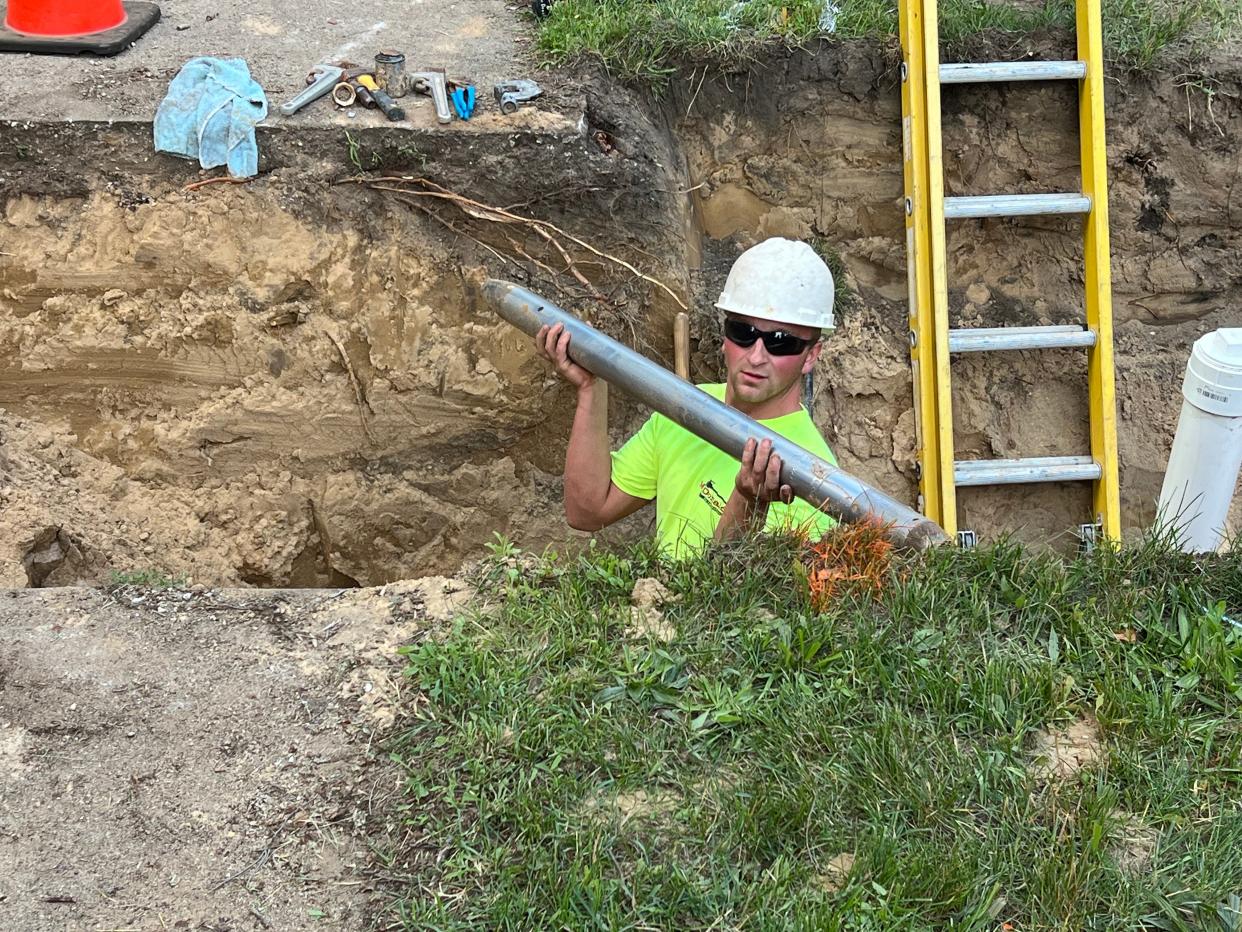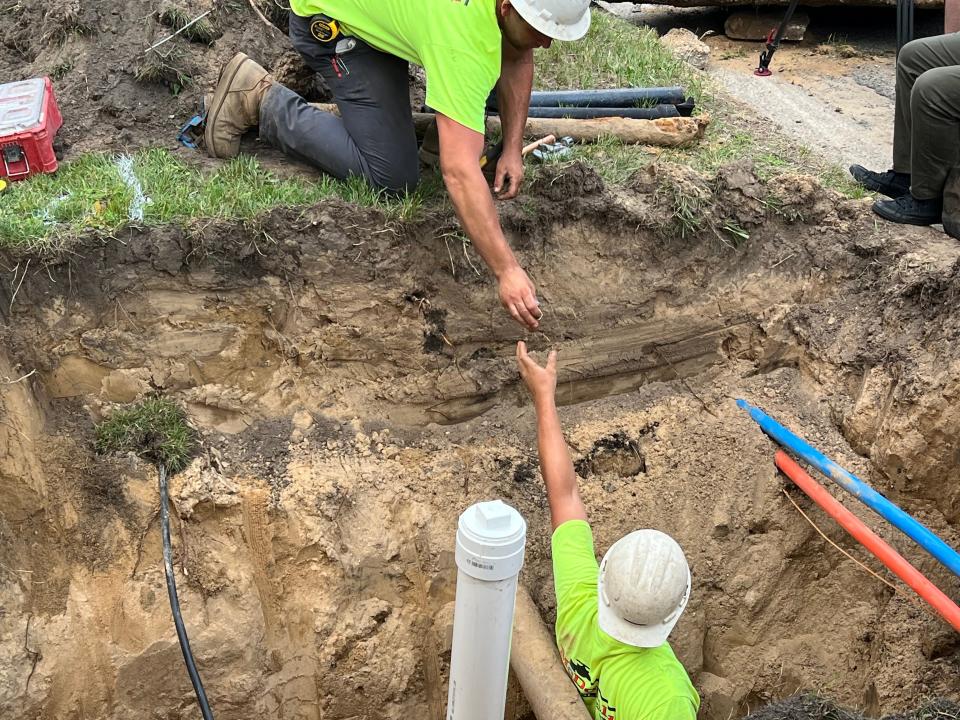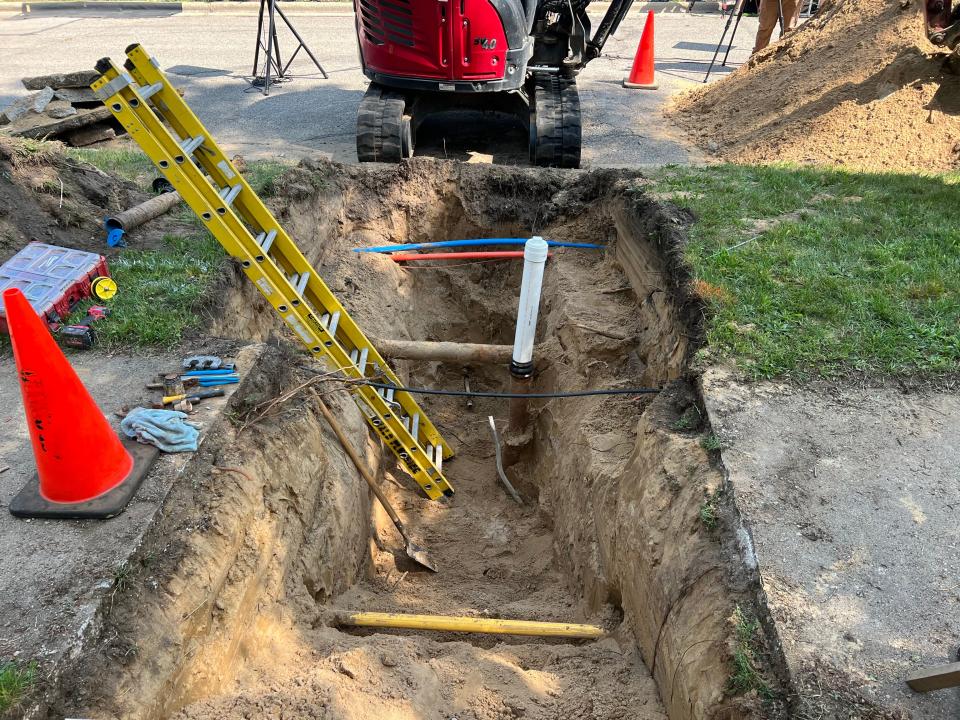Local, federal partners work to expand lead pipe replacement

GRAND RAPIDS — A lack of access to clean drinking water has gripped communities across Michigan in the past decade, first when lead leached into Flint's water supply in 2014 and more recently in Benton Harbor, where alarms were raised over elevated lead samples in the city's water in 2021.
While local and state officials have worked to remedy the situations in Flint and Benton Harbor, the issue could reach far more than the residents of those two communities — there are roughly 450,000 lead service lines that need replacement in Michigan currently, said Aaron Keatley, acting director of the Michigan Department of Environment, Great Lakes and Energy.
Replacing those service lines can be expensive, and in the past, the costs of such work have been thrust upon local communities and even the affected residents. But now, federal funding could unlock more opportunities for pipe replacement at the local level.
Officials, including Keatley and U.S. Environmental Protection Agency (EPA) Administrator Michael Regan, visited a neighborhood in Grand Rapids Wednesday to highlight this funding — Grand Rapids is using a $5.1 million grant it received from the EPA in 2021 to replace over 1,600 of its existing lead service lines with copper piping.
"We have over 21,000 lead service lines here in our city, with more than half of them located in our neighborhoods of focus," said Grand Rapids Mayor Rosalynn Bliss at the event. "Our plan that we set out to accomplish back in 2017 is the full replacement of all lead service lines."
So far in 2023, Grand Rapids has replaced around 2,000 lead service lines. Bliss added the EPA grant "has enabled us to accelerate this important work in our community."
Lead's lasting impact on clean drinking water
More than a century ago, lead pipes were a fixture in almost every major U.S. city, according to Safe Piping Matters. While there was some understanding about the toxicity of lead and the dangers of lead poisoning in the 19th century, the Safe Drinking Water Act wasn't amended to ban lead piping in newly constructed public water lines until 1986.
Lead was cheaper and more malleable, or easier to work with, than other types of piping at the time, a National Bureau of Economics Research study found.

But lead is toxic, and particularly harmful for children. Lead exposure among children can lead to behavioral and developmental issues. Lead exposure can also be harmful for adults, including through increased risk of high blood pressure and kidney damage, according to the World Health Organization.
While Congress moved to ban lead piping for newly constructed water lines in the mid-'80s, decades-old water mains still contained lead piping. To remedy this and prevent future water crises, Congress and the Biden administration moved to include $15 billion in the Bipartisan Infrastructure Act of 2021 dedicated to lead service line replacement across the U.S.
"For many years, lead was the go-to material for service lines that were delivering drinking water to many of our homes, our businesses, our schools, and unfortunately, too many of these pipes still remain," Regan said. "But the science has been clear for decades: There's absolutely no acceptable level of lead, especially not for our children."
Progress made: A year after raised alarms, almost all lead pipes replaced in Benton Harbor
A focus on oft-overlooked communities
Regan, Keatley, Bliss, U.S. Rep. Hillary Scholten, D-Grand Rapids, and Michigan Senate Majority Leader Winnie Brinks, D-Grand Rapids, visited a home near the city's Madison neighborhood where a crew of workers was installing new copper pipe, which doesn't corrode as easily and doesn't contain toxic materials. The neighborhood is one of the "neighborhoods of focus" Bliss referenced, meaning the city has found higher concentrations of lead service lines in place.
In these "neighborhoods of focus," Grand Rapids is encouraging residents to apply for a private lead line replacement through the EPA grant.
Earlier this year, the EPA launched a Lead Service Line Replacement Accelerators initiative, part of the White House's goal of 100% lead service line replacement in the U.S. in the next decade. The Biden administration estimated in 2021 up to 10 million American households rely on lead pipes and service lines for water delivery.
The goal of the initiative is to assist the communities most in need of replacing outdated and dangerous pipes in accessing available federal funding. Scholten said the grant funding is a game-changer for these communities.
"We've recognized that we need to do better for our environment, and for each other. The clean pipes contribute to healthy homes, and healthy homes set our families up for success," Scholten said.

Lead service line replacements continue
In Grand Rapids, Bliss estimated crews will replace around 4,000 lead service lines in 2023. Work has also continued in Flint and Benton Harbor to replace the pipes affecting residents.
Flint and the Michigan Department of Health and Human Services announced last year that 95% of lead service lines had been replaced. Flint entered a nearly $18 million partnership with Lakeshore Global Corp. to replace the remaining lines last September.
In Benton Harbor, MDHHS data shows 99.8% of lead service lines have been replaced, with only nine more lines to go.
Contact Arpan Lobo: alobo@freepress.com. Follow him on Twitter @arpanlobo.
This article originally appeared on Detroit Free Press: Federal funding expands access to lead service line replacement

